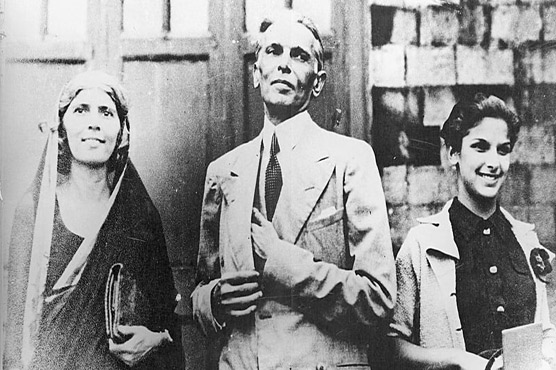Comment: Our Father's daughter

During the visit she went to pay respects at her father�s mausoleum and wrote in the visitor�s book:
The founder of Pakistan, Quaid-i-Azam Mohammad Ali Jinnah’s blood ran in two living things: the daughter born to him in 1919, and the country he created in 1947. Interestingly, both the daughter and the country were also born on the same day, August 15. Even more poignantly, as Jinnah was estranged from his own offspring due to religion, the country he created might not welcome him now due to religious reasons too. The similarities are striking, the irony is deafening.
November 2, 2017, the flesh and blood of Jinnah, Dina Wadia died. The life of Dina had many similarities with that of her parents. Just as her father married a Parsi woman, she fell in love with a Parsi man. The marriage of Rattanbai Pettit with Jinnah ‘shook India’ as argued in the recently published book by Sheela Reddy in the same way as Dina’s wedlock with Neville Wadia also shocked the country. It is said that when Dina expressed her desire to marry Wadia in 1938, Jinnah, who was fast becoming the ‘sole spokesman’ of the Muslims of India pleaded with her:
‘There are millions of Muslim boys in India,’ to which the young seventeen year old Dina retorted: ‘Father, there were millions of Muslim girls in India. Why did you not marry one of them?’ Life had come full circle.
Jinnah’s biographer, Stanley Wolpert, once noted that Jinnah was that person who singularly altered the course of world history, modified the map of the world, and created a nation-state—a rare feat indeed. However, his own progeny refused to live in it. This simple, yet significant, fact showed the complication of the partition of India. Even though the partition of India was affected on seemingly clear concepts, the fact that millions of Muslims remained in India and millions of Hindus remained in Pakistan, muddled the waters, maintained the heterogeneity of the new countries, and challenged the stark distinctions some were trying to create. With Dina’s demise a chapter is closed, yet the effects remain.
Even though Jinnah disapproved of his daughter marrying Wadia in 1938, a reconciliation of sorts had been affected in the years following, and the father and daughter exchanged a number of warm letters. After all, in the melting pot of India how could a few differences keep people apart forever? The outwardly cold and stubborn Jinnah was a father and a human too.

Dina Wadia pictured during her visit to Pakistan in 2004. Photo: Yousaf Salahuddin
Dina Wadia only visited Pakistan four times in her 98 long years. During her last visit in 2004, she went to pay respects at her father’s mausoleum and wrote in the visitor’s book: “May his dream for Pakistan come true.” Dina knew that her sibling, Pakistan, has also disappointed Jinnah, but just like an elder sister she still hoped that Pakistan would become the prodigal son and be reconciled to its father.
The writer teaches at IT University Lahore and is the author of ‘A Princely Affair: The Accession and Integration of the Princely States of Pakistan, 1947-55.’ He tweets at @BangashYK.

